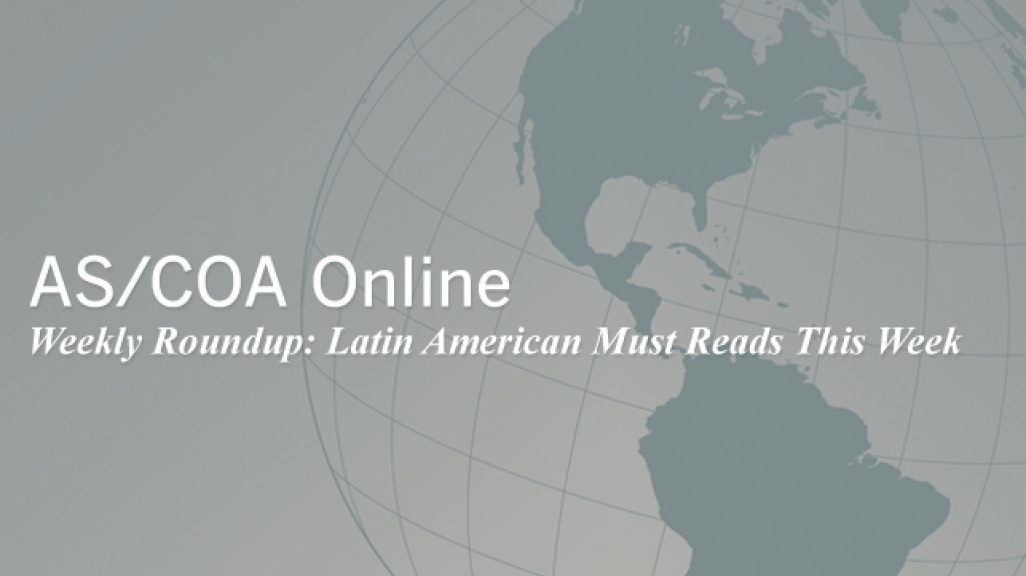Weekly Roundup: World Cup Kicks off, Chile Cancels Dam Project, Colombia Votes
Weekly Roundup: World Cup Kicks off, Chile Cancels Dam Project, Colombia Votes
Coca cultivation plummets in Peru and Mexico's Senate takes up the debate over the secondary energy laws.
World Cup kicks off with host's win and protests. Brazil's World Cup started Thursday June 12 in São Paulo with the host's win over Croatia and protests inside and outside the stadium. Amnesty International issued “a yellow card” against São Paulo’s military police after they contained protests using tear gas. Some 20 people were arrested and at least three journalists were hurt.
Despite the protests, Brazilians celebrated its first goal and cheered for player Neymar—who scored two goals in the 3-1 win over Croatia. CNN compiled images of the opening ceremony and first match.
The New York Times’ The Upshot looks at World Cup opinions in 19 participating countries, showing that most forecast Brazil as the winning team and the country that plays “the most beautiful” soccer. It also finds that Argentina, the United States, and Iran appear to be the most disliked teams. For betting fans, FiveThirtyEight offers up an interactive predicting winners from each World Cup group. Finally, GlobalPost takes on European racism in soccer with an article covering how World Cup teams would be negatively affected if first-generation immigrants were prevented from playing.
Get the facts on the World Cup with an AS/COA Online infographic.
Follow Americas Quarterly’s World Cup coverage.
Candidates battle over peace talks ahead of Colombia's runoff vote. With time slipping away before the October 15 presidential vote, President Juan Manuel Santos and rival Oscar Iván Zuluaga exchanged barbs in debates, including over differing positions on peace talks with the Revolutionary Armed Forces of Colombia, better known as the FARC. Moreover, on Tuesday, Santos announced exploratory talks to begin negotiations with the National Liberation Army as well.
La Silla Vacía offers a side-by-side comparison of the candidates' platforms.
As a new AS/COA Online poll update shows, the last round of polls indicate it's unclear who will come out the winner on Sunday.
Hydro Hiatus: Chilean government cancels dam project. On June 10, Energy Minister Máximo Pacheco announced the government's rejection of plans to build five dams on two rivers. Energy powerhouses Colbún and Endesa already invested $300 million in the HidroAysén energy project, and total costs are expected to reach $8 billion. Critics say the venture would jeopardize the environment and indigenous culture, while project supporters argue the dams would have supplied up to 20 percent of Chile's energy demand within the next 10 years.
Read an Americas Quarterly article on the Latin America's famously foiled energy projects.
Mexico starts debate on laws to implement energy reform. The Mexican Senate began debate this week of a package of 21 secondary laws that would pave the way for implementation of the country's landmark energy reform. Animal Politico reports the debate, which began 50 days late, is expected to run from June 10 through June 23. The left-leaning Party of the Democratic Revolution, which opposes legislation opening the sector to private investment, predicts it is unlikely the laws will win congressional approval before July 15.
COA's Director of Energy Christian Gómez Jr lays out an overview of the 21 secondary laws.
Coca cultivation plummets in Peru. New information released by the UN Office on Drugs and Crime (UNODC) reports that coca cultivation shrank by 17.5 percent in Peru in 2013, leading the agency's Peru representative to call it “the most remarkable reduction rate achieved in the last 14 years.” Last year, the UNODC said Peru had overtaken Colombia as the world's biggest producer of coca and cocaine. Whether the drop will continue remains to be seen; earlier this month, President Ollanta Humala announced his government would postpone crop eradication in the country’s top coca-producing region.
A recent U.S. News & World Report article looks at and suggests solutions to combat crime in Latin America.







